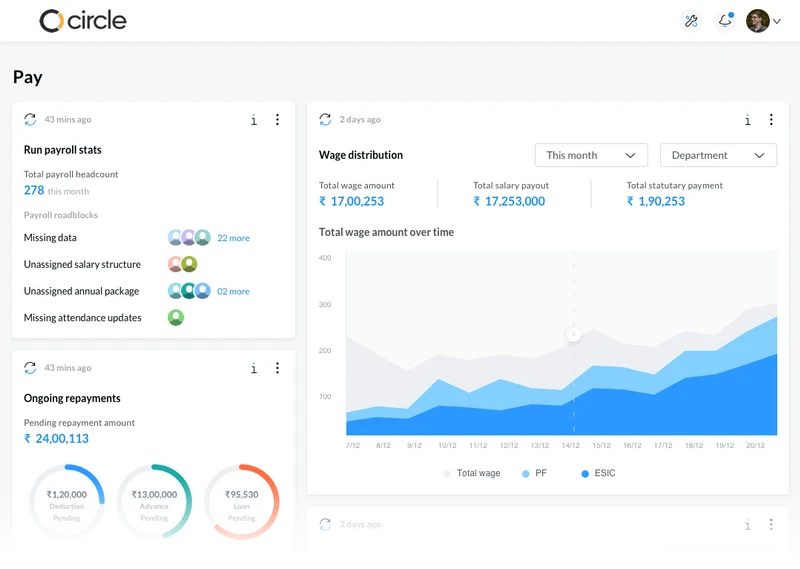A notice period in India is the time an employee must give their employer before resigning from their job. The length of the notice period will vary depending on the job and the terms of the employment contract.
The Industrial Disputes Act of 1947 is India’s primary legislation governing notice periods. This act sets out the minimum notice period for employees and employers and other important provisions related to the termination of employment.
Types of Notice Periods in India
Fixed Notice Period: This type of notice period is specified in the employment contract and is usually one month or more.
Variable Notice Period: This type of notice period is not specified in the employment contract and is negotiable between the employer and the employee.
No Notice Period: An employer may sometimes waive the requirement for a notice period if both parties agree.
Statutory Notice Period: This type of notice period is set out in the Industrial Disputes Act 1947 and is usually one month or more.
3- Month Notice Period in the Tech Sector
The 3-month notice period made compulsory by the tech company before quitting jobs hurt the sector. According to Business Today, a 90-day notice period increases the cost of the tech sector, like Tata Consultancy Services, by over INR 4,500 crores in hidden costs. That is why human resource management worldwide chooses one-week to one-month notice periods.
The 3-months notice period also affects employees’ morale, which restricts them from taking up new opportunities. It also reduces their bargaining power when negotiating for higher salaries or better job roles. Furthermore, it can lead to a decrease in productivity, as outgoing employees may become demotivated, and the level of productivity decreases for ongoing projects.
Moreover, it hinders the smooth transition of HR roles and responsibilities. After the global pandemic, there was acute competition in the tech sector to hire new employees. However, due to the extended notice period, companies tend to lose candidates in tech giants for time constraints.
Thus, companies should consider reducing the notice period from three months to one month or less to improve employee morale and organisational harmony. Employers and employees can benefit from flexible notice periods in the tech industry.
A shorter notice period means companies can quickly fill vacant positions and reduce employee attrition rates. According to the CEO of Netconnect Global, a 15-day notice period is the best for tech companies. The only disadvantage is that it can lead to a higher turnover rate.
How does the Notice Period Work in India
In India, the employment contract determines the notice period. The notice period can vary from one month to three months, depending on the type of employment and the company’s policies. Generally, human resource management prefers a more extended notice period to protect their interests and ensure they have enough time to find a suitable replacement for the departing employee. The prolonged transition period is ideal for senior leadership or executive-level positions.
Additionally, the Indian government has issued guidelines for the notice period in the country. According to the guidelines, employers should provide a minimum of one month’s notice period for all employees. However, employers can also offer extended notice periods depending on their needs and requirements.
Benefits of Notice Period
- It maintains good morale in the workplace, as it ensures that employees are not leaving abruptly.
- It gives employees time to transition out of their current role and prepare for their next job as greener pastures.
- HR roles and responsibilities allow both parties to resolve any outstanding issues or disputes that may have arisen during employment. Companies can also collect employee feedback to plan for operational changes during this period.
- It allows employers to protect their interests by ensuring that employees do not take confidential information or intellectual property with them when they leave.
- India-based employees get protection from Indian labour laws, which require employers to provide a minimum of one month’s notice period for all employees. It helps ensure that employees only get a prior warning before abrupt termination.
Employee Retention and Notice Period
The notice period is essential to employee retention. An extended notice period gives employees more time to consider their options and decide whether to stay with the company or move on. It also gives employers more time to negotiate a better salary or job role for the employee, which can help retain them. Employee well-being and satisfaction are also important factors in employee retention, and a shorter notice period can help improve morale. It makes employees feel they are not being asked to get stuck with the company without their liking.
Notice periods are essential for ensuring business continuity. They provide employers with enough time to find a suitable replacement and make necessary arrangements. Sophos, a cyber-security company, has let go of around 450 workers worldwide, including Indians, which account for 10% of its personnel, to reach the best combination of growth and success.
Do Employees Get a salary in the Notice Period in India?
Yes, employees are entitled to receive their salary during the notice period in India. According to Indian labour laws, employers must pay the employee’s entire salary for the notice period. It includes any bonuses or other benefits that may be due to them. The employer must also provide a written payment confirmation at the end of the notice period.
Indian Employment and Labour Law
The Industrial Disputes Act of 1947 governs Indian employment and labour law. This act outlines the rights and responsibilities of employers and employees, including notice period requirements. It also guides how to handle disputes between employers and employees.
The current norms for notice period in India are as follows:
- Employers must provide a minimum of one month’s notice period for all employees.
- Employers can offer extended notice periods depending on their needs and requirements.
- Employees are entitled to receive their salary during the notice period.
- Employers must provide written payment confirmation at the end of the notice period.
Global Notice Period
The notice period requirements in India are similar to those in other countries. In the United States, employers must provide a minimum of two weeks’ notice for all employees. In the United Kingdom, employers must provide a minimum of one month’s notice for all employees. Acute competition spree in the job market has made it difficult for employers to retain employees, and a more extended notice period can help them do so.
What is a Reasonable Notice Period for Resignation
Employees should submit a resignation letter to the employer in writing and provide a minimum of two weeks’ notice. Acceptance of resignation is at the employer’s discretion. It gives employers enough time to find a suitable replacement and make necessary arrangements. On the other hand, it gives employees enough time to finish pending work and ensures that all tasks and administration work are complete before leaving. Contract workers may be required to give an extended notice period, depending on the terms of their contract
Employment Terms
Employers should clearly outline the notice period requirements in their employment contracts. HR roles and responsibilities help employers and employees know their rights and duties. It also helps to avoid any misunderstandings or disputes arising during the resignation process. A 15-day notice period is a reasonable time for both employers and employees. The employer can accept an earlier notice period, but it is not mandatory. Employment laws in India get designed to protect the rights of both employers and employees. However, a more extended notice period can help employers avoid any loss of time or disruption in operations.
Ambiguity in Government Labor Laws can lead to disputes between employers and employees. Therefore, both parties must understand their rights and responsibilities before signing the employment contract.
What is "Garden Leave"?
Garden leave describes the period between an employee’s resignation and their last day of work. During this period, the employee is under employment by the company but is not required to attend work. The employer may choose to pay the employee during this period, depending on the terms of their employment contract. Human resource management may also monitor productivity levels during this period with the intent of knowledge transfer. Amicable transition is essential for employers and employees, and garden leave can help ensure a smooth transition.
What is "Pay in Lieu"?
Senior or executive-level positions may require a more extended notice period. In such cases, employers may offer ‘pay in lieu’ of the notice period. It means the employee will be paid for the entire notice period, even if they do not work during this time. It is an incentive to encourage employees to stay with the company until their last day. The level of uncertainty in the job market has made it difficult for employers to retain employees, and pay in lieu of notice period can help them do so.
Can you Quit without Notice in India?
If an employee wishes to leave without serving the notice period, they must obtain written consent from their employer. It happens through a mutual agreement between the two parties. The employer may also waive the notice period if they deem it necessary. However, this happens in writing and with both parties’ consent. If employees quit without notice, human resource management can avoid wasting time and resources. The company should consider the people & culture when making such decisions.
Wrapping Up
The notice period helps employers find suitable replacements and ensures that all tasks get completed before the employee leaves. Companies should follow internal processes to ensure a smooth transition.
At sumHR, our goal is to amplify the effectiveness of HR teams worldwide. We have designed a comprehensive cloud-based HR platform, providing a configurable, adjustable HRMS to enable HR personnel to automate tedious tasks, cut through confusion and increase employee satisfaction with their HR experience. We firmly hold that Human Resources is the cornerstone of any business. Visit our website today!
Frequently Asked Questions
1. Can I leave the company during the notice period?
Leaving the company without serving the notice period can have legal consequences and negatively impact your future employment. It’s crucial to fulfill the terms of the employment contract.
2. What is HR Policy during the Notice Period?
HR policy regarding the notice period typically outlines the required amount of notice an employee must give before leaving a company, often stated in the employment contract. Failing to serve the required notice can result in legal action or negatively impact future employment.
3. Can an employer waive the notice period for an employee?
Yes, an employer can waive the notice period for an employee with mutual agreement between both parties. However, it is important to check the relevant labour laws and company policies to ensure it is allowed.
4. How long is the standard notice period in India?
The standard notice period in India varies, but it is usually around 30 to 90 days for senior-level employees and 15 to 45 days for other employees. The employment contract, company policy, and industry norms determine the exact notice period.








